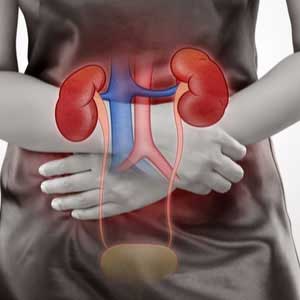Urinary Infections treatment in Vijayawada
What is a urinary tract infection ?
A urinary tract infection (UTI) is an infection that can occur in any part of the urinary system, including the kidneys, ureters, bladder, and urethra. The most common form is cystitis, which is an infection of the bladder. UTIs are usually caused by bacteria, most commonly Escherichia coli, which enter the urinary tract through the urethra. Symptoms often include a frequent urge to urinate, burning sensation during urination, cloudy urine, pelvic pain, and sometimes fever. Risk factors include sexual activity, certain types of birth control, menopause, urinary retention, and a history of UTIs. Diagnosis typically involves a urinalysis and urine culture to identify the bacteria responsible. UTI Treatment in Vijayawada usually consists of antibiotics, and symptoms typically improve within a few days of starting the medication. It’s essential to seek medical attention if UTI symptoms arise to avoid risks.
What can cause a UTI ?

Urinary tract infections (UTIs) primarily arise from the introduction of bacteria into the urinary system, with Escherichia coli (E. coli) being the most common culprit. Various factors contribute to the likelihood of developing a UTI, including female anatomy, as women have a shorter urethra, facilitating easier access for bacteria. Sexual activity may introduce bacteria into the urinary tract; thus, it’s often linked to increased UTI incidence. Additionally, urinary retention or incomplete emptying of the bladder can create an environment conducive to bacterial growth. Certain medical conditions, such as diabetes, which compromises the immune response, or structural abnormalities in the urinary tract, can further exacerbate the risk. Other lifestyle factors, such as dehydration and the use of certain contraceptives (like diaphragms), may contribute to UTIs as well. Frequent use of antibiotics can disrupt normal urinary tract flora, leading to overgrowth of pathogenic bacteria. Understanding these causes is crucial for prevention and management of UTIs, allowing individuals to take proactive steps in safeguarding their urinary health along with the help of Best uti doctors in Vijayawada .
Commonly seen symptoms of a UTI:
- Frequent Urination: A strong, persistent urge to urinate, often producing small amounts of urine.
- Burning Sensation while urinating
- Cloudy or Strong Smelling Urine: Urine may appear cloudy or have a strong, unusual odor.
- Blood in Urine: Hematuria, or blood in urine, can occur, giving it a pink or red hue.
- Pelvic Pain: Discomfort or pain in the lower abdomen or pelvic region.
- Fever and Chills: Some may experience fever, chills, or general malaise if the infection has spread to the kidneys.
- Nausea and Vomiting: Particularly in cases of a kidney infection.
- Pressure or Cramping: Discomfort in the lower back or side may be experienced.
What happens if UTI is left untreated ?
Untreated urinary tract infections (UTIs) can lead to several serious complications. One of the most significant risks is the spread of the infection to the kidneys, resulting in pyelonephritis, which can cause permanent kidney damage or even kidney failure if not addressed promptly. Additionally, recurrent UTIs may occur, leading to a cycle of persistent infections that can significantly impact quality of life. Furthermore, Best nephrologist in Vijayawada also state that untreated UTIs can increase the likelihood of developing sepsis, a life-threatening condition where the body responds aggressively to an infection, potentially leading to organ failure. Women may also experience complications during pregnancy, such as premature labor or low birth weight in newborns. In men, untreated UTIs can lead to prostatitis or epididymitis, resulting in pain and reproductive issues. Additionally, the chronic inflammation associated with untreated urinary infections can contribute to bladder dysfunction or interstitial cystitis. Lastly, there's the potential for the development of antibiotic-resistant bacteria, complicating future treatment options. Thus, prompt diagnosis and treatment of UTIs are crucial to prevent these complications and safeguard overall health.
Can UTI’s be prevented ?
Preventive techniques for urinary tract infections (UTIs) focus on lifestyle choices and hygiene practices. One effective measure is to maintain proper hydration, as drinking plenty of water helps flush bacteria from the urinary tract. Regular urination, particularly after sexual intercourse, is recommended to eliminate bacteria that may have entered the urethra. Women should practice good hygiene, including wiping from front to back after using the toilet, to prevent bacteria from the anal area reaching the urethra. Wearing breathable cotton underwear and avoiding tight-fitting clothing can help reduce moisture buildup, which fosters bacterial growth. Additionally, incorporating cranberry juice or supplements into the diet may prevent bacteria from adhering to the bladder wall, though research on efficacy varies. For individuals prone to recurrent infections, discussing prophylactic antibiotics with a healthcare provider may be beneficial. It’s also important to avoid using irritating feminine products, such as douches or vaginal sprays, which may disrupt the natural vaginal flora. Regularly scheduled gynecological or urological check-ups with Dr. M.V. Sai Krishna can help monitor and manage individual risk factors for UTIs. Implementing these techniques can significantly reduce the likelihood of developing a UTI while maintaining overall urinary health.
FAQs of urine infections:
How do I know if I have a urine infection?
A doctor's diagnosis is typically made through a physical examination, medical history, and laboratory tests such as a urinalysis and urine culture.
What is the most common cause of urine infections?
The most common cause of UTIs is E. coli bacteria, which can enter the urinary tract through the urethra and multiply in the bladder.
Who is at risk of getting a urine infection?
Women are more likely to get UTIs due to their anatomy, but anyone can get a UTI, especially those who experience urinary tract symptoms or have pre-existing medical conditions.
Can I prevent urine infections?
Yes, there are several ways to reduce the risk of getting a UTI, including drinking plenty of water, wiping from front to back after using the bathroom, and avoiding spermicides and scented soaps.
How long does it take for symptoms to resolve after treatment?
Symptoms typically resolve within 24-48 hours after starting treatment with antibiotics, but it may take longer for the infection to fully clear.
Can I get a urine infection again?
Yes, UTIs can recur, especially if underlying conditions are not addressed or if there are issues with medication compliance. It's essential to follow up with your doctor and complete the full course of treatment to prevent recurrence.

